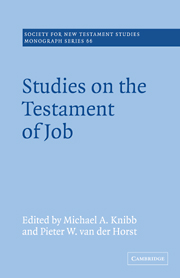Book contents
- Frontmatter
- Contents
- List of abbreviations
- 1 Introduction
- 2 The Testament of Job: a history of research and interpretation
- 3 P. Köln Inv. Nr. 3221: Das Testament des Hiob in koptischer Sprache. Ein Vorbericht
- 4 Zur Komposition und Konzeption des Testaments Hiobs
- 5 Images of women in the Testament of Job
- 6 Job's perseverance in the Testament of Job
- Index of passages
- Index of authors and subjects
3 - P. Köln Inv. Nr. 3221: Das Testament des Hiob in koptischer Sprache. Ein Vorbericht
Published online by Cambridge University Press: 07 October 2009
- Frontmatter
- Contents
- List of abbreviations
- 1 Introduction
- 2 The Testament of Job: a history of research and interpretation
- 3 P. Köln Inv. Nr. 3221: Das Testament des Hiob in koptischer Sprache. Ein Vorbericht
- 4 Zur Komposition und Konzeption des Testaments Hiobs
- 5 Images of women in the Testament of Job
- 6 Job's perseverance in the Testament of Job
- Index of passages
- Index of authors and subjects
Summary
Die Papyrussammlung am Institut für Altertumskunde der Universität Köln besitzt seit 1964 umfangreiche Teile eines Papyruskodex in koptischer Sprache. Bald nach dem Erwerb wurde der Inhalt des Kodex von L. Koenen und M. Weber identifiziert. Es handelt sich um eine Sammlung apokrypher Texte, unter denen das Testament Hiobs und das Testament Abrahams den gröβten Anteil haben. Gröβere Textpartien sind auβerdem aus den Acta Petri et Andreae erhalten. Ein kleines Fragment, ebenfalls zum Kodex gehörig, trägt wenige Zeilen aus dem Testament des Adam.
Der interessanteste Text dieser Sammlung dürfte das Testament Hiobs sein. Der Kölner Kodex ist der einzige Textzeuge in koptischer Sprache und der früheste Textzeuge überhaupt. Die älteste Handschrift des griechischen Textes stammt aus dem 11. Jahrhundert. Unser Kodex dürfte dagegen schon dem 5. Jahrhundert angehören. In einem Addendum zur Übersetzung des Testamentum Hiobs von Mark Philonenko hatte Manfred Weber 1968 bereits auf die Bedeutung des Kölner Kodex hingewiesen. So konnte Berndt Schaller in seiner Übersetzung des griechischen Textes von 1979 schon eine von ihm selbst erstellte erste Abschrift des koptischen Textes in seinem kritischen Apparat verwerten.
Zu Beginn dieses Jahres wurde die Bearbeitung des Kodex den obengenannten übertragen.
Wir haben uns bisher nur mit dem Testament Hiobs beschäftigt, den Text weitgehend kontrolliert und an einigen Stellen gegenüber der Erstabschrift verbessern können.
- Type
- Chapter
- Information
- Studies on the Testament of Job , pp. 33 - 45Publisher: Cambridge University PressPrint publication year: 1990
- 1
- Cited by

